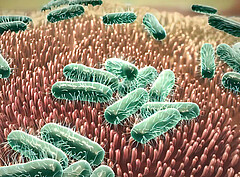Microbiome therapy:
Success factors for fecal transplantations [08.08.22]
Tailwind for promising therapeutic approach: Study at the University of Hohenheim paves the way for broader clinical application of fecal bacteria transmission
Treatment of patients with antibiotics and colonic irrigation prior to fecal transplantation promotes the colonization of donor bacteria. This is the conclusion of a study conducted by the University of Hohenheim in Stuttgart. Prof. Dr. W. Florian Fricke and Daniel Podlesny from the Department of Microbiome and Applied Bioinformatics, together with other researchers, developed a model that can be used to predict the effects of the therapy on the gut microbiome of individual patients. It may partly explain why the success of fecal transplantation for treating some diseases, such as diabetes or ulcerative colitis, has been mixed so far. They identified common mechanisms for the reorganization of the microbiome after transplantation in very different patient groups and diseases – pointers as to how this form of microbiome therapy could be clinically optimized and used in a more targeted manner, i.e. tailored to individual patients. More details can be accessed in the Cell Reports Medicine doi.org/10.1016/j.xcrm.2022.100711
The totality of all microorganisms in and on the human body, the microbiome, play an essential role in health. Changes in its composition affect the microbial interplay with the human body. Disturbances in the microbial ecosystem of the human gut are, therefore, associated with numerous metabolic, inflammatory, and infectious diseases.
A promising therapeutic approach for diseases related to the microbiome is the transfer of microbes from the gut of healthy donors into the gastrointestinal tract of patients, known as FMT (Fecal Microbiota Transplantation). This process is often referred to in highly simplified terms as fecal transplantation. However, relatively little is known about the interactions between the donor and patient microbiomes after the procedure, i.e., what factors are necessary for successful colonization of the donor bacteria in the recipient's gut and how can transplantation be maximized.
Prediction model with wide application
"Our goal was to understand the mechanisms involved and to develop a general predictive model that can be applied to different groups of patients," said Prof. Dr. Fricke. He and his doctoral candidate Daniel Podlesny, who will soon be moving to the European Molecular Biology Laboratory (EMBL) in Heidelberg, have now succeeded in doing this using a new bioinformatics method developed by their research group.
Here, a particular focus was on the transmission of individual bacteria or strains through transplantation. To this end, they used a special method they developed to detect even minor changes in the microbiome. In addition to their own research results, they also collected data from 14 other clinical trials. They were then in a position to evaluate the data of more than 250 people who had undergone fecal transplantation.
Their key finding: Regardless of the underlying disease, only one strain prevailed after transplantation for most bacterial species. Patients mostly received either the same strain as before treatment or a new, transmitted strain, but only in rare cases a mixture. The more severely the existing intestinal microbiome before transplantation had been damaged or impaired by pretreatment with antibiotics, the more successful the colonization by the donated microbes.
The two researchers are not alone in their findings. At the same time and independently of each other, the working group at the EMBL in Heidelberg, to which Daniel Podlesny will transfer, and a working group in Italy have now also arrived at comparable results.
Intestinal ecosystem
"Basically, transplantation aims to establish a new or modified microbial ecosystem in the gut," explained Prof. Dr. Fricke. "Normally, the gut microbiome of healthy adults prevents the colonization of invading microorganisms that compete for the same ecological niches. If the natural interplay is disrupted, new microbes are better able to colonize or replace existing strains."
According to the researchers, this is also the reason why fecal transplantation had a success rate of around 90 percent, especially for recurrent infections with the bacterium Clostridioides difficile. Due to the repeated administration of antibiotics, which are used in conventional therapy to treat infections, the gut microbiome is massively disturbed – the ideal conditions for colonization with new bacteria after fecal transplantation.
It also explained why the colonization of new microorganisms was much more limited after treatment of patients with the inflammatory bowel disease ulcerative colitis, severe obesity or diabetes. In these patients, the researchers observed a largely intact gut microbiome prior to treatment.
A step towards personalized medicine
The results of the working group did, however, identify approaches that could be used to improve the efficiency of fecal transplantations regardless of the underlying disease being treated. Both antibiotic pretreatment and colonic irrigation prior to transplantation resulted in increased colonization of the transmitted microorganisms in patients. However, the risks of such pretreatment must be weighed against the severity of the clinical picture and the expected success of the treatment.
In addition, the results point in the direction of personalized medicine: Simulations with their model showed that the number of strains transferred from different donors to individual patients can vary by a factor of up to ten. Success depended on the combination of patient and donor. Thus, the model could form the basis for personalized approaches to fecal transplantation if matching donors and recipients were first selected prior to treatment.
"With our model, we provide a toolbox that can be used to accurately predict the effects of fecal transplantation and customize them for patients," said Prof. Dr. Fricke, summarizing the benefits. "It's a cornerstone for future developments of targeted, personalized therapies to alter the gut microbiome."
Additional information
D Podlesny, M Durdevic, S Paramsothy et al: Identification of clinical and ecological determinants of strain engraftment after fecal microbiota transplantation using metagenomics, Cell Reports Medicine 3, 100711, 16 August 2022, doi.org/10.1016/j.xcrm.2022.100711
Text: Stuhlemmer
Contact for press:
Prof. Dr. W. Florian Fricke, University of Hohenheim, Dept. of Microbiome and Applied Bioinformatics,
T +49 (0)711 459 24841, E w.florian.fricke@uni-hohenheim.de


